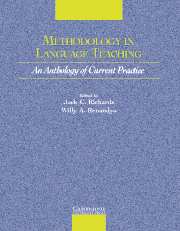Book contents
- Frontmatter
- Contents
- Acknowledgments
- Introduction
- Section I Approaches to Teaching
- Section 2 Lesson Planning and Classroom Management
- Section 3 Classroom Dynamics
- Section 4 Syllabus Design and Instructional Materials
- Section 5 Task and Project Work
- Section 6 Learning Strategies
- Section 7 Teaching Grammar
- Section 8 Teaching Pronunciation
- Section 9 Teaching Speaking
- Section 10 Teaching Listening
- Section 11 Teaching Vocabulary
- Section 12 Teaching Reading
- Section 13 Teaching Writing
- Section 14 Assessment
- Section 15 Technologies in the Classroom
- Section 16 Professional Development
- Credits
- Author Index
- Subject Index
Section 16 - Professional Development
Published online by Cambridge University Press: 10 November 2010
- Frontmatter
- Contents
- Acknowledgments
- Introduction
- Section I Approaches to Teaching
- Section 2 Lesson Planning and Classroom Management
- Section 3 Classroom Dynamics
- Section 4 Syllabus Design and Instructional Materials
- Section 5 Task and Project Work
- Section 6 Learning Strategies
- Section 7 Teaching Grammar
- Section 8 Teaching Pronunciation
- Section 9 Teaching Speaking
- Section 10 Teaching Listening
- Section 11 Teaching Vocabulary
- Section 12 Teaching Reading
- Section 13 Teaching Writing
- Section 14 Assessment
- Section 15 Technologies in the Classroom
- Section 16 Professional Development
- Credits
- Author Index
- Subject Index
Summary
INTRODUCTION
The last section in this anthology deals with the central issue of teachers' professional development. Over the years we have come to realize that, to quote Hargreaves and Fullan (1992, p. ix), “the teacher is the ultimate key to educational change and school improvement.” Teachers do not simply implement the curriculum. They define and refine the curriculum; they interpret and transform the curriculum in a way that makes learning more manageable for the learners. In other words, it is what teachers think and do at the classroom level that eventually determines what learners learn in the classroom. Thus, given the key role of the teachers in the classroom, it is imperative that professional growth become a top priority. Teachers should constantly develop not only their knowledge of the subject matter, but also their knowledge of pedagogy. The three articles in this section look at the different aspects of professional development.
Ur sets the scene by defining the concept of professionalism in the context of the work of the English teacher. After discussing the notion of professionalism, she asks if we English teachers can be rightly called professionals. Do we belong to a community of professionals who interact and exchange ideas for the purpose of developing our professionalism? Are we a learning community which is interested in acquiring new knowledge and experimenting with new ideas? Are we committed to achieving certain desirable standards in our profession?
- Type
- Chapter
- Information
- Methodology in Language TeachingAn Anthology of Current Practice, pp. 385 - 387Publisher: Cambridge University PressPrint publication year: 2002
- 5
- Cited by



